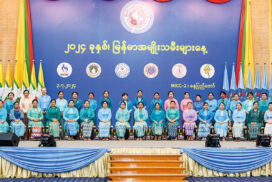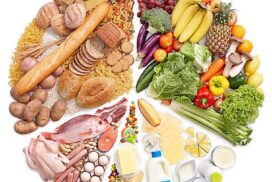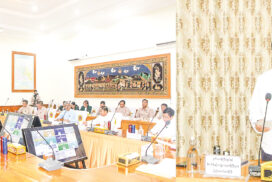About 15 million acres of rain-fed field in the 2020 monsoon season in our country will produce over 13 million tones of rice. And, the summer paddy have been put under over 1.8 million acres so far with the use of irrigation water and river water pumping system.
With rice production in surplus every year, our country has prospects for regaining our past status as the top rice export country.
In 2018, our rice export reached more than 3 million tons, the most in over 70 years.
To bring the past glory of rice production back to the country, the farmers and stakeholders in the rice industry need to learn and practice new agricultural methods which are environmental friendly and can guarantee safe food.
In Myanmar, most of the farmers in our country are small and they struggling for livelihood, battling in vain against the consequences from the use of chemical fertilizers and pesticides.
We need to step up efforts to raise awareness about the excessive use of chemical inputs, such as pesticides and fertilizers, to ensure that farmers as well as consumers enjoy good health through the production of safe food.
In Myanmar, most of the farmers in our country are small and they struggling for livelihood, battling in vain against the consequences from the use of chemical fertilizers and pesticides.
Chemical farming puts farmers into debt and fertiliser companies into profits. Besides, soils damaged by excessive use of chemical imports, expensive and needless farming inputs, water-intensive/water-pollutive, lethal and ecologically harmful farming practices (all of which emanate from chemical farming) do no good to agricultural advancement, and to public health.
Agricultural experts are obliged to conduct research and disseminate knowledge to farmers who are dealing with the consequences of using chemical inputs and the impact of climate change.
We need to set a target of producing safe and nutritious food using Good Agricultural Practices (GAP) to penetrate foreign markets.
In this regard, we need to intensify efforts for providing training to farmers on using critical inputs in an economic and sustainable way to obtain higher yields and follow a pattern of sustainable agriculture in the future.
We should not forget the fact that small farmers play a crucial role in ensuring food sufficiency and nutritional content, abolishing poverty, and promoting inclusive and sustainable agricultural development operations.
Now, time comes to boost the farmers’ livelihood and development our agriculture sector, which will contribute to economic growth, by encouraging farmers to use the good agricultural practices.













